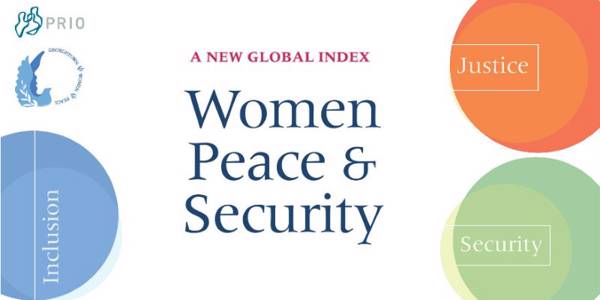
Please be welcome to this launch event for the new Global Women, Peace and Security Index.
Women are at the heart of efforts to achieve sustainable peace through inclusion, justice, and security worldwide. This notion is explicit in the 2000 agenda established by United Nations Security Council Resolution 1325 on Women, Peace and Security, which urged all actors to increase women’s participation and incorporate gender perspectives in all UN peace and security efforts.
This was re-emphasized in 2016, when the United Nations General Assembly and the United Nations Security Council adopted resolutions on “Sustaining Peace,” and the complementary 2030 Agenda for Sustainable Development, which recognize the need to build inclusive, just, and peaceful societies for all.
Global indices are a way to assess and compare national progress against such goals, by distilling an array of complex information into a single number and ranking. While there are a growing number of global indices, none has brought together the three important dimensions of women’s inclusion, justice, and security. Gender indices are typically limited to indicators of inclusion, such as whether women complete secondary school or are in paid work. These aspects of inclusion are undoubtedly important, but they are incomplete in the absence of aspects of justice and security. It is surely misleading to focus exclusively on girls’ schooling where girls are not safe in their home or community. Likewise, traditional measures of security include an array of conflict indicators and assessments but invariably ignore systematic bias and discrimination against women and girls.
The Georgetown Institute for Women, Peace and Security (GIWPS) and the Peace Research Institute of Oslo (PRIO) have developed a new global index that captures both peace and security — and women’s inclusion and justice — for the first time ever. We draw on recognized international data sources to rank 153 countries around the world — covering more than 98 percent of the world’s population — in a way that focuses attention on key achievements and major shortcomings in the context of the Sustainable Development Agenda.
A primary goal of the Index is to accelerate progress on both the international Women, Peace and Security agenda and the Sustainable Development Goals. Our Index is the first gender index to be developed in the framework of the 2030 Agenda, and reflects a shared vision that countries are more peaceful and prosperous when women are accorded full and equal rights and opportunity. The Index will be updated every two years and will track progress ahead of the UN High-level Political Forum in 2019, the 2030 Agenda for Sustainable Development and the 20th anniversary of 2000 UN Security Council Resolution 1325 on Women, Peace and Security. The Index will have important utility for many sectors. Policymakers will be able to use its rankings to evaluate progress and set priorities, for the private sector it offers a tool for risk analysis, and civil society activists can celebrate achievements, highlight gaps, and hold their governments accountable for implementing the women, peace and security agenda.
Programme
10.30–10.40: Welcome
Torunn L. Tryggestad, Director, PRIO Centre on Gender, Peace and Security
10.40–10.50: Opening address
Ine Eriksen Søreide, Minister of Foreign Affairs, Norwegian Ministry of Foreign Affairs
10.50–11.10: Introducing the index
Jeni Klugman, Managing Director of the Georgetown Institute for Women, Peace and Security (GIWPS)
11.10–11.20: Measuring and including the security dimension
Marianne Dahl, Senior Researcher, PRIO
11.20–12.15: Panel discussion
H.E. Shukria Barakzai, Ambassador, Afghan Embassy in Norway
Kjersti Andersen, Director General, Department of UN and Humanitarian Affairs, Ministry of Foreign Affairs
Gro Lindstad, Executive Director, FOKUS
Henrik Urdal, Director, PRIO
Topics for discussion during panel debate:
- What do rankings and insights from the Women, Peace and Security Index tell us about the global state of the women, peace and security agenda?
- Which areas emerge as priorities for action to improve women’s inclusion, justice, and security?
- How can data be better used to promote and support women’s rights, sustainability and peace? What are the key data constraints to be addressed?
- How can the Index results be used by policymakers, civil society and the private sector to advance women’s inclusion, justice and security?
12.15–12.30: Q&A
12.30-13.30: Light lunch and mingling
The Global Index on Women, Peace and Security is funded by the Norwegian Ministry of Foreign Affairs and the Bank of America Charitable Foundation.





